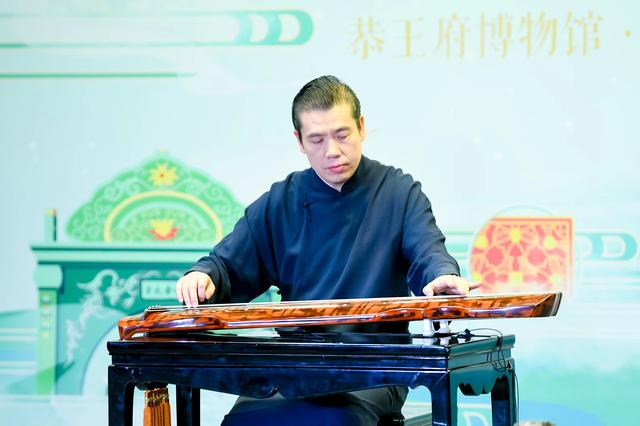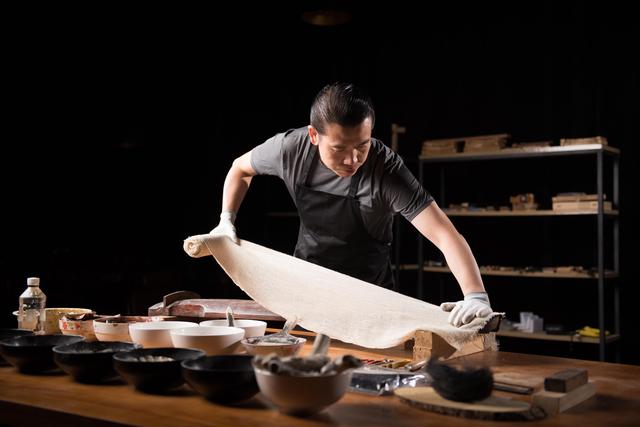Famous Guqin Songs Integrate "Fighting the Sky" to spread traditional culture to young people
The long fantasy novel "Breaking the Sky" is the famous work of the Internet writer Tian Qian Tudou. Since 2009, this inspirational story of "30 years in Hedong, 30 years in Hexi, don't bully young poor" has inspired hundreds of millions of readers. The novel has been serialized for more than ten years, and has gone through the development of publishing, audio, animation, comics, TV series, games and other derivatives. Among them, the animation "Breaking the Sphere" has reached the championship of annual viewing volume, with a cumulative viewing volume of over 12 billion. .
On September 18, at the Grand Theatre of Prince Kung's Mansion, Yang Zhijian, a national first-class performer and representative inheritor of Shanghai's intangible cultural heritage "Guqin-making", performed a live performance of the famous Guangling songs "Long Xiang Cao" and "Fighting Fight". "Breaking the Sphere" anime theme song "Straight Breaking the Sphere" co-adapted "Dragon Soaring the Sphere". He integrated the scenes and imaginations of the ancients about soaring in the sky in "Dragon Soaring Exercise" into the youthful fighting spirit of "Breaking the Sky", hoping to spread the tradition to contemporary young people in an innovative form that integrates ancient music and modern cultural works. culture.

Yang Zhijian performed "Dragon Soaring in the Sky" live. When ancient music meets modern music, a new spark is created. Yang Zhijian revealed that when he composed "Dragon Soaring in the Sky", he first learned about the work "Breaking the Sky" - it tells the story of a young man who is passionate, struggling, constantly A story of adversity. This reminded him of a very old guqin piece called "Long Xiang Cao", which describes the flight of a dragon. In the minds of Chinese people, the dragon is an important totem. It can be big or small, it can rise and can be hidden. When it rises, it soars in the universe, and when it is hidden, it lurks in the waves. meaning. "Long Xiang Cao" can be traced back to Zhuangzi's "Autumn Water", which is a very important piece of Taoism. After hundreds of years of inheritance, it has evolved from a tune expressing Taoism's cognition of heaven, earth and autumn waters to a tune describing a dragon.
Combined with the music of the anime "Breaking the Sphere", he made a brand-new fusion of the classic Guqin repertoire and modern anime music. "You can say it is a new creation, or you can say it is an adaptation." In his opinion, ancient music pays more attention to the expression of smooth lines. Modern music, especially popular songs, is often accompanied by a stronger rhythm and expresses the core idea in the form of thematic repetition. The two have different creative motives and different means to achieve them.
So, how exactly do you combine them? Yang Zhijian thought of a modern electronic MIDI synthesis method. In the first half, electronic music is used to present a wider and looser white space, allowing more space for the guqin instrument, and the feelings of Longxiang and Jiutian can be expressed, more sparse, and more linear. In the second half, more drum beats and more strong rhythm beats are added. On the one hand, it can gradually get better and push the mood up. On the other hand, it is more suitable for the theme of modern pop music, and the two can be integrated.

Through high-quality online literature, Yang Zhijian called on people to pay attention to the intangible cultural heritage. On the day of the performance on September 18, Yang Zhijian used a replica of the ancient famous qin "Jiuxiao Huanpei". "Jiuxiao Huan Pei" has been an important tool in the qin altar since the end of the Qing Dynasty, and it has been respected by scholars and guqin players for hundreds of years, and is regarded as "Dingding Tangwu" and "immortal product". It has an ancient shape and perfect pronunciation. After the founding of the People's Republic of China, it entered the Palace Museum and is a nationally renowned artistic treasure.
"Chinese music creation is inseparable from excellent traditional culture. Confucius said: Prosperity is based on poetry, standing in ritual, and success in music. We create Chinese music based on oriental stories, use Chinese music to tell Chinese stories well, and show cultural self-confidence. Carry forward the Chinese spirit. As a traditional musical instrument of the Chinese nation, the guqin contains exquisite cultural heritage and is the cohesion of thousands of years of traditional culture." Yang Zhijian said.
This performance is also part of the "Seeing Intangible Cultural Heritage - Prince Kung's Mansion Museum × China Literature Group Strategic Cooperation Conference". On the same day, the Ministry of Culture and Tourism of Prince Kung’s Mansion and China Literature Group reached a strategic cooperation to jointly launch the “Three-Year Plan for the Promotion of Chinese Excellent Traditional Culture of Prince Kung’s Mansion Museum × China Literature Group”. According to the strategic cooperation agreement, the Prince Kung Mansion Museum and China Reading Group will integrate advantageous resources, based on the historical and cultural resources and intangible cultural heritage display platform of the Prince Kung Mansion Museum, relying on the online literature digital resources and rich IP development experience of China Literature Group, through the Jointly build a literary creation base, hold seminars on national style works, organize excellent traditional culture essay competitions, develop a series of cultural and creative products, etc., and integrate Chinese excellent traditional culture represented by intangible cultural heritage into the digital cultural industry.
As one of the series of projects, the "Prince Gong's Mansion Museum × China Literature Group's Online Literature Creation Base" project was officially launched at the press conference in the form of a pair of writers and non-genetic inheritors. Solo and 2, Yan ZK, Grenade afraid of water, Bronze Sui, Hera Qing, 5 writers, paired with Jing Yongxiang, Wang Shuchang, Zhang Zhuang, Gu Weiying and Yang Zhijian, inheritors of intangible cultural heritage skills. After the pairing is completed, the writers will follow the inheritors to further study and exchange, understand the historical past and current development of the intangible cultural heritage, and create with the theme of the intangible cultural heritage, appealing to more people through high-quality online literature works Pay attention to the inheritance and promotion of intangible cultural heritage.
 渝公网安备 50010702504639号
渝公网安备 50010702504639号